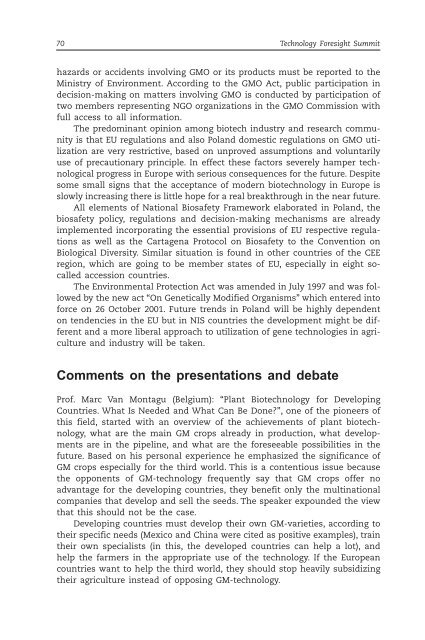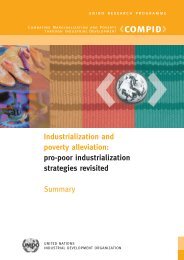TECHNOLOGY FORESIGHT SUMMIT - Unido
TECHNOLOGY FORESIGHT SUMMIT - Unido
TECHNOLOGY FORESIGHT SUMMIT - Unido
You also want an ePaper? Increase the reach of your titles
YUMPU automatically turns print PDFs into web optimized ePapers that Google loves.
70 Technology Foresight Summit<br />
hazards or accidents involving GMO or its products must be reported to the<br />
Ministry of Environment. According to the GMO Act, public participation in<br />
decision-making on matters involving GMO is conducted by participation of<br />
two members representing NGO organizations in the GMO Commission with<br />
full access to all information.<br />
The predominant opinion among biotech industry and research community<br />
is that EU regulations and also Poland domestic regulations on GMO utilization<br />
are very restrictive, based on unproved assumptions and voluntarily<br />
use of precautionary principle. In effect these factors severely hamper technological<br />
progress in Europe with serious consequences for the future. Despite<br />
some small signs that the acceptance of modern biotechnology in Europe is<br />
slowly increasing there is little hope for a real breakthrough in the near future.<br />
All elements of National Biosafety Framework elaborated in Poland, the<br />
biosafety policy, regulations and decision-making mechanisms are already<br />
implemented incorporating the essential provisions of EU respective regulations<br />
as well as the Cartagena Protocol on Biosafety to the Convention on<br />
Biological Diversity. Similar situation is found in other countries of the CEE<br />
region, which are going to be member states of EU, especially in eight socalled<br />
accession countries.<br />
The Environmental Protection Act was amended in July 1997 and was followed<br />
by the new act “On Genetically Modified Organisms” which entered into<br />
force on 26 October 2001. Future trends in Poland will be highly dependent<br />
on tendencies in the EU but in NIS countries the development might be different<br />
and a more liberal approach to utilization of gene technologies in agriculture<br />
and industry will be taken.<br />
Comments on the presentations and debate<br />
Prof. Marc Van Montagu (Belgium): “Plant Biotechnology for Developing<br />
Countries. What Is Needed and What Can Be Done?”, one of the pioneers of<br />
this field, started with an overview of the achievements of plant biotechnology,<br />
what are the main GM crops already in production, what developments<br />
are in the pipeline, and what are the foreseeable possibilities in the<br />
future. Based on his personal experience he emphasized the significance of<br />
GM crops especially for the third world. This is a contentious issue because<br />
the opponents of GM-technology frequently say that GM crops offer no<br />
advantage for the developing countries, they benefit only the multinational<br />
companies that develop and sell the seeds. The speaker expounded the view<br />
that this should not be the case.<br />
Developing countries must develop their own GM-varieties, according to<br />
their specific needs (Mexico and China were cited as positive examples), train<br />
their own specialists (in this, the developed countries can help a lot), and<br />
help the farmers in the appropriate use of the technology. If the European<br />
countries want to help the third world, they should stop heavily subsidizing<br />
their agriculture instead of opposing GM-technology.

















